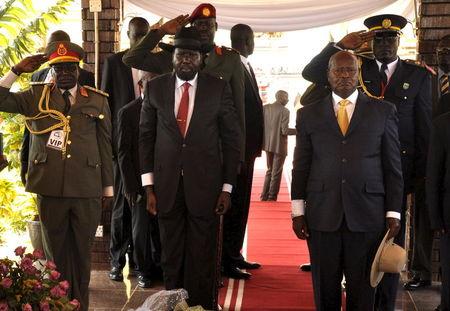Advertisement
Obama to discuss a 'Plan B' for South Sudan ahead of August deadline
ADDIS ABABA (Reuters) - President Barack Obama will discuss a "Plan B" for South Sudan with African leaders on Monday that could include sanctions or other penalties if the country's warring parties do not forge a peace deal by mid-August, a U.S. official said.
Speaking to reporters on Air Force One as Obama traveled to Ethiopia from Kenya, the official said Monday's meeting was not expected to lead to a breakthrough to halt the country's civil war, which has raged since December 2013.
Obama is on a two-country tour of Africa. The presidents of Uganda and Kenya, the prime minister of Ethiopia, the chairwoman of the African Union, and the foreign minister of Sudan are all expected to attend the meeting in Addis Ababa. Representatives from South Sudan were not invited.
“This is an opportunity to reinforce the effort that’s on the table and to strategize ... on next steps in the event that it doesn’t succeed," the official said.
The official said the Intergovernmental Authority on Development, a bloc of African countries which has been leading peace efforts between backers of the nation's president, Salva Kiir, and rebel leader Riek Machar, had set an Aug. 17 deadline for both sides to accept a final offer.
If they fail to agree, additional measures would be considered, she said.
“I don’t think anybody should have high expectations that this is going to yield a breakthrough. The parties have shown themselves to be utterly indifferent to their country and their people, and that is a hard thing to rectify,” she said.
Elements of a "Plan B" could include an arms embargo and sanctions on individuals' assets and travel. Sanctions could be implemented with other countries in the region, the European Union, or the United Nations.
Fighting in the country has killed thousands of people and displaced more than 2.2 million people. Some 40 percent of the population relies on aid, much of it provided by the United States, to survive, U.S. officials said.
Getting a consensus among those at the meeting may be a challenge.
One U.S. official noted that Sudan was arming and supporting the South Sudan rebels, while Uganda was supporting the South Sudan government by helping to defend the capital city Juba and protect an airport. The United States would like to see Uganda encourage Salva Kiir to accept a "rational" deal, the official said.
(Reporting by Jeff Mason; Editing by Howard Goller)



















Add new comment